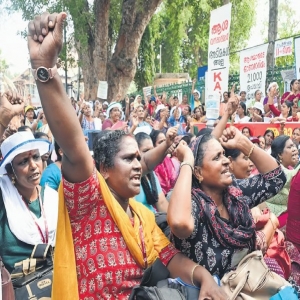
.png) Joseph Maliakan
Joseph Maliakan
.jpg)
The minimum wage in Kerala is 700 rupees a day, but the Accredited Social Health Activists (ASHAs), who are the backbone of Kerala's acclaimed healthcare system, are paid an honorarium of 7,000 rupees a month, which means they earn only 232 rupees a day.
During COVID-19, the ASHAs, whom the media described as ANGELS OF HOPE, were the foot soldiers who fought from the front barefoot without even Personal Protective Equipment (PPE). From conducting door-to-door surveys and ensuring proper quarantine facilities for international travellers and COVID-affected people, ASHAs were present everywhere.
Despite their immense contributions to healthcare and the floods of 2018 and the Wayanad landslide of July 2024, the ASHAs are not treated as government employees but as volunteers. Instead of wages or salaries, they receive honorariums and performance-based incentives, the first fixed and paid by the state government and the second paid by the Union government.
The ASHAs in Kerala, mostly women belonging to the lower strata of society, have been demanding that they be treated as workers and paid the minimum wage of 21,000 rupees a month, given the option to retire between the age of 62 and 65, they be paid a retirement allowance of 5 lakh rupees and also provide them with a pension scheme.
The ASHAs were introduced by the Government of India under the National Rural Health Mission (NRHM) in 2005. ASHA, the government guidelines said, will be the first port of call for any health-related demands of deprived sections of the population, especially women and children, who find it difficult to access health services. She would be a promoter of good health practices. She will also provide a minimum package of curative care as appropriate and feasible for that level and make timely referrals.
Her roles and responsibilities would be as follows: ASHA will take steps to CREATE AWARENESS and provide information to the community on determinants of health such as nutrition, basic sanitation and hygienic practices, healthy living and working conditions, information on existing health services and the need for timely utilisation of health and family welfare services. She would COUNSEL women on birth preparedness, the importance of safe delivery, breastfeeding and complementary feeding, immunisation, contraception and prevention of common infections, including Reproductive Tract Infections, Sexually Transmitted Infections and care of the young child.
Regarding compensation to ASHA, the guidelines say, "ASHA would be an HONORARY VOLUNTEER and would not receive any salary or honorarium. Her work would be so tailored that it does not interfere with her normal livelihood!
In the beginning, the ASHAs had only one or two hours of work, but their workload has increased over the years, and sometimes they have to work 8 to 10 hours or more. Various trade unions and associations have demanded that ASHAs be recognised as "workers" and paid minimum wages.
The 26,000 ASHAs in Kerala hoped that the Left Democratic Government in Kerala led by Pinaray Vijayan would make provisions in the 2025 State budget to meet their demands. However, there was no mention of the ASHAs in the state budget presented on February 7, 2025. Upset at their neglect by the government, the Kerala Asha Health Workers' Association (KAHWA), on February 10, 2025, started a protest demonstration in front of the Secretariat building in Thiruvananthapuram.
When NRHM was introduced, ASHAs were recruited as voluntary workers, and their work focussed on immunisation, promoting hospital births and reducing child and maternal mortality, but over the years, ASHAs have been called upon to carry out more and more work.
One protester told an interviewer that now being an ASHA is a full-time job: "Everyone calls ASHAs for various tasks, be it ward members, police officers, block development officials, or Panchayat or village officials. All of them want us to be available on call 24 hours, but NOBODY WANTS TO PAY."
ASHAs often have to pay for their patients out of pocket for transporting pregnant women to the clinic or hospital or to buy essential medicines for some poor patients. They often do not even get the 7000 rupees honorarium because they are fined if they miss any assignment. There is a fine of 500 rupees for missing ASHA meetings, 700 rupees for missing Panchayat meetings, and 500 rupees for missing centre duty. There is also a fine for delay in submitting data or reports. ASHAs are also sometimes asked to collect confidential and embarrassing personal data like the number of drug addicts or alcoholics in the community!
At the 45th Indian Labour Conference in New Delhi in May 2013, representatives of various trade unions demanded the recognition of ASHAs as "workers" so that they became eligible for minimum wages. At the same time, nothing stops the state government from increasing the honorarium of the ASHAs because the matter is under the purview of the state government and is not contingent upon recognising ASHAs as workers.
Unfortunately, the ASHAs are placed between the devil and the deep sea. On the one hand, the Union government is blaming the states for the sad plight of the ASHAs throughout the country, numbering one million, while the state governments have put the blame on the Union governments' lack of financial support even for centrally introduced schemes.
In the ASHA workers' case, one also has to consider the question of the state exploiting women's labour. There is no doubt that these women are overworked and underpaid. Considering the fact that the ASHA workers mostly belong to marginalised sections of society, the delay in meeting their demand for minimum wages cannot be justified any longer.